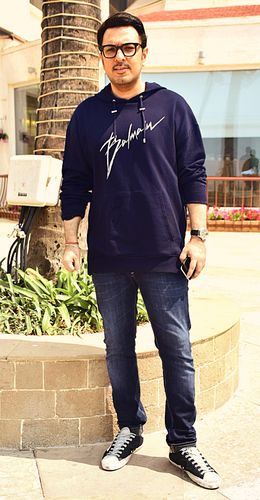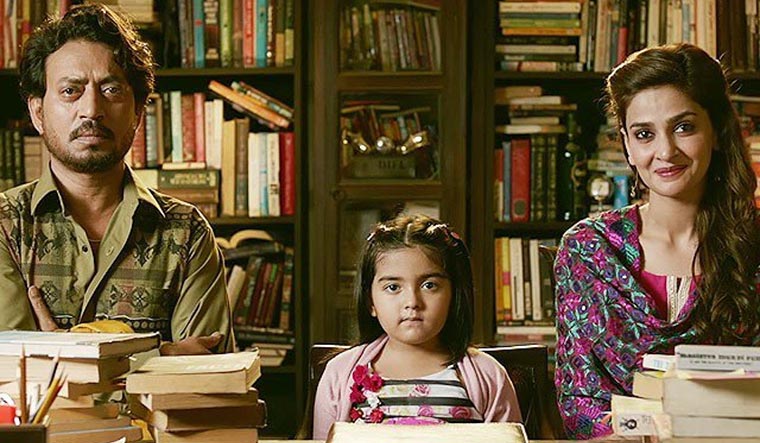Three years, three successful films—Hindi Medium in 2017, Stree in 2018 and Luka Chuppi in 2019. Critics might not have raved about them in particular, but the numbers roared at the box office, making Dinesh Vijan a proud man. The producer’s office in a quiet lane in Santacruz is quite busy, as the work has started on Hardik Mehta’s Rooh Afza, starring Janhvi Kapoor and Rajkummar Rao along with Varun Sharma.
Has he cracked the code for box office success? “If you think you have cracked the code, you have actually ruined it,” says Vijan, 37. “It is actually like the formula for [curing] hair fall; nobody really has it. If you ever think you have cracked the code, it is the beginning of the end. Evolution is the only solution of sorts. I feel India has changed. It is no longer a country that aspires to be the west, but is actually very proud of what it is. The purchasing power has moved from just cities to smaller towns, which are, for us, the big boys. And they are the ones who come on Friday. They want stories about this India, for this India, and of this India.”
He reasons that the good performance of Shriram Raghavan’s Badlapur, a revenge drama set in Pune-Badlapur, worked because of that understanding. Vijan figured out that the audience were willing to absorb a good film, irrespective of the place where it is set in. “There are no rules,” he says. “That’s what is beautiful about filmmaking.” Owing to the huge Punjabi family that he belongs to, he has travelled to places across the country and knows how the essence of a certain place can lend itself to better a film.
Vijan, at times, talks in jest, trying to crack a funny one-liner. Then follows it by saying that is “not the right answer”. Then he starts over. That, perhaps, says a lot about his idea of beginning and re-beginning. He can, it seems, take it easy while starting afresh or starting over.
When he decided to produce films at the age of 23, after quitting his six-month-old bank job, Vijan had no idea about the industry nor any associations. He has been around for almost 15 years now. “The process of how to do is now clear, but the first decision is all gut,” he says. The first film he bankrolled—Being Cyrus—was narrated by Homi Adajania, then a first-time director and almost as old as Vijan. It was the beginning of a beautiful friendship and the collaboration resulted in films like Cocktail and Finding Fanny, and the upcoming Angrezi Medium.
Being Cyrus was also the reason Vijan met Saif Ali Khan, with whom he started Illuminati Pictures, the production house behind films like Agent Vinod and Love Aaj Kal. The business relationship with Khan grew out, and Vijan started Maddock Films.
“I am very lucky to have got the kind of opportunities that I have got,” he says, adding that one thing that he has learnt over the years is that unless he has got his own hands dirty and worked hard, the films do not work. “The most important decisions that we take in this room is ‘which story to tell?’” he says. “Now, the decision is not just based on ‘which story’, it is also about telling the relevant story. That is all instinct. That’s what I rely on. Everything else is a process, which you need to get right.”
The story of his family is almost like a film. His grandfather’s brother studied in an English medium school in Rawalpindi and became aspirational. He left home in search of a better life. Because of this, Vijan’s grandfather was not allowed to study in an English medium school; he went to an Urdu-medium school. But, as the fate of the country changed with the partition, he moved to Mumbai and set up a logistics business.
“I am the first to get into films in my family,” says Vijan. “I love Bachchan and films. I came in with really big eyes and wanted to make it.”
His filmography shows that he has made it, despite a few setbacks. The first film with which he tasted failure was Raghavan’s Agent Vinod. “I feel I learnt the maximum from that film,” he says. “Logistically, it was such a challenge. But the biggest learning was that no matter what, you have to back the director. It taught me how to make Badlapur, or how to make an unadulterated Sriram Raghavan film.”
Another learning was during Raabta, his directorial debut, which failed critically and financially. He realised that direction and production need full immersion. He will not take up direction again unless such a story comes his way that is difficult to say no to. “Someone very wise once told me that the worst thing that can happen to you is to make a really bad film and see it work. You know it’s bad, and then you won’t know what to make.”
For the time being, Vijan is happy being a producer. This year, he has had a successful release in Luka Chuppi, and three more films—Arjun Patiala, Made In China and, hopefully, Angrezi Medium—will release. The interesting line-up spills on to the next year with Imtiaz Ali’s film starring Sara Ali Khan and Kartik Aryan, and Rooh Afza and Bala. The work on Arun Khetarpal’s biopic, too, is on. Raghvan is working on the script of the film, tentatively titled Ikees. And Vijan does not want to interfere with the creative process. Meanwhile, he has finalised a few shows for the streaming space.




